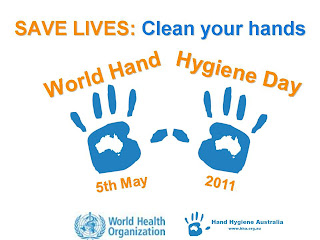 |
| Source: WHO |
The impact of improved sanitation, potable water and handwashing is greatest in resource poor settings. Challenges exist for promoting hygiene as a large scale public health intervention. This would require both political will and preferential financial allocation. Further research is required to better define the outcomes and efficacy of hygiene interventions.
A nuanced perspective on hygiene, with a focus on hand hygiene in developed countries and modern hospitals, suggests that the law of diminishing returns may be at play. Aggressive promotion of hand hygiene in modern hospitals is the norm, however, improvements in hand hygiene may not result in infection prevention salvation. Meticulous hand hygiene may impact many yet not all healthcare associated infections. Infection prevention in the hospital requires hand hygiene, proper antibiotic use, safety checklists and best practices 'bundles', proper sterilization and disinfection of instruments and surfaces along with adherence to isolation precautions.
Here is a blog entry on the above paper by my colleague Dr. Michael Edmond.
Hand hygiene may not be the definitive infection control intervention but we are by no means ready to write it off.